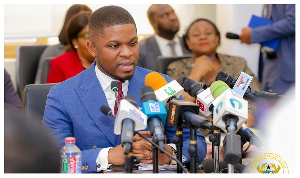Trial of suspects in the now famous cocaine case involving Kwabena Amaning (alias Tagor) and Alhaji Issah Abass resumes tomorrow (Tuesday) with ACP Kofi Boakye appearing as a witness for the prosecution.
Tuesday’s appearance by ACP Kofi Boakye as a prosecution witness confirms a dailyEXPRESS report of Monday December 4, 2006 that the Police Director of Operations (now on leave) “would not be prosecuted after all” but “may instead be used as a prosecution witness.”
Our information confirmed by sources at the Attorney Generals Department & the Police Service indicated that he will be testifying in the on-going cocaine prosecutions.
In a chat with a number of lawyers following the confirmation of our December 4th story, they explained it will not be possible for ACP Kofi Boakye to be prosecuted after the current case in which he’ll be used as a witness for the prosecution.
“Where a person gives evidence before a court which amounts to confession of a crime, none of the testimonies given in evidence by a witness can be used against him for subsequent prosecution,” one of the lawyers explained. ACP Kofi Boakye, in whose house a meeting of persons now suspected to be involved in narcotics drugs was taped, was expected to be prosecuted on a charge of conspiracy to import and export drugs without license under PNDC law 236. This was after he was invited by the Bureau of National Investigations (BNI) on Friday September 29, around the same time that Interior Minister Albert Kan Dapaah was announcing his ministry and government’s position on the recommendations of the Justice Georgina Woode Committee.
The former police operations chief who spent about five hours with the BNI was to have been charged with an offence similar to that of Kwabena Amaning and three others (Alhaji Issah Abass, Kwabena Acheampong and Alhaji Moro), who were part of the now famous tape recording.
The Woode committee had indicated in its report that it found substantial evidence to show that instead of protecting national interest and fighting crime, ACP Kofi Boakye and the four persons mentioned above rather sought to promote their own agenda for financial reward. It also concluded the ACP Boakye and the four others in pursuance of their common goal connived to find the owners of the cocaine missing from the MV Benjamin. At his press conference in September, the Interior Minister announced further that the Committee’s finding from the recorded meeting that ACP Kofi Boakye's specific role was to "stay in the background and sort out" the Columbians, should they prove naughty.
"The Committee found that in the presence of ACP Kofi Boakye, Tagor and Alhaji Issah Abbas confessed to past drug related transactions that they had engaged in and the unlawful gains they had made out of these deals” he added. But the proposed prosecution of the police chief has now fizzled out, confirming widely held views that there was no way ACP Kofi Boakye could be prosecuted, both based on the evidence available and because other vital and sensitive information ought to be protected.
Lawyers for the embattled ACP had in the aftermath of the Committee’s decisions argued strongly in an interview with the Chronicle that “if Kofi Boakye is to be prosecuted, then the tone would be set for an unprecedented legal battle in this country because in that case, we would be expected to do what we have to do as lawyers and that will be to defend our client with whatever evidence we have.”
Lead counsel Joe Aboagye Debrah had stated further that “the Committee’s recommendation has no basis and so there is no basis for any charges against Kofi Boakye, since those charges cannot stand in court.”
Mr. Boakye who is known for his bravery and feared by hardened criminals has meanwhile returned to the Ghana Law School, where he hopes to add a law degree to his academic qualifications.
Crime & Punishment of Monday, 15 January 2007
Source: dailyEXPRESS












